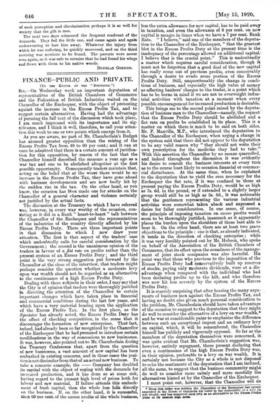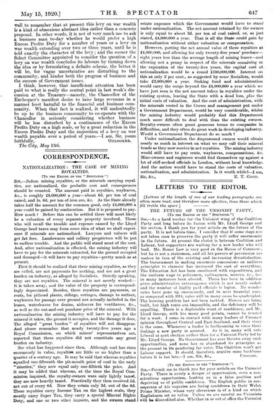FINANCE—PUBLIC AND PRIVATE. ITo THE EDITOR OF TEE " EFEoriToit."3
SIR,—On Wednesday week an important deputation of representatives of the British Chambers of Commerce and the Federation of British Industries waited on the Chancellor of the Exchequer, with the object of protesting against the increase in the Excess Profits Tax, and to suggest certain alternatives. Having had the advantage of perusing the fall text of the discussion which took place, I am much impressed with its importance and its sig- nificance, and I think it well, therefore, to call your atten- tion this week to one or two points which emerge from it.
As you are aware, no part of Mr. Chamberlain's Budget has aroused greater opposition than the raising of the Excess Profits Tax from 40 to 60 per cent.; and it can at once be admitted that there is a certain amount of justifica- tion for this opposition, by reason of the fact that the Chancellor himself described the measure a year ago as a war tax and one to be abolished altogether at the first possible opportunity. Consequently traders maintain that, acting on the belief that at the worst there would be no increase in the Excess Profits Tax, they have gone ahead with business developments and are now badly hit by the sudden rise in the tax. On the other hand, as you know, the occasion has b'een made one for attacks on the Chancellor of a general character and violence certainly not justified by the actual facts.
The discussion at the Treasury to which I have referred was, however, in every way worthy of the occasion, con- sisting as it did in. a frank " heart-to-heart " talk between the Chancellor of the Exchequer and the represe.ntatives of the industries of the country directly affected by his Excess Profits Duty. There are three important points in that discussion to which I now draw your attention. The first is that aspect of the traders' case which undoubtedly calls for careful consideration by the Government ; the second is the ureminieus opinion of the • traders in favour of a flat rate on profits rather than the present system of an Excess Profits Duty ; and the third point is the very strong suggestion put forward by the Chaneellor at the close of the interview, that traders might perhaps consider the question whether a moderate levy upon war wealth should not be. regarded as an alternative to the continuance of a high Excess Profits Duty. Dealing with these subjects in their order, I may say that the City is of opinion that traders were thoroughly justified in directing the attention of the Chancellor to certain important changes which have taken place in financial and commercial conditions during the last few years, and which have a very material bearing upon the application • of the Excess Profits Tax. In the first place, as the Spectator has already noted, the Excess Profits Duty has the effect of checking competition, in the sense that it discourages the formation of new enterprises. That- fact, indeed, had already been so far recognized by the Chancellor of the Exchequer that he had promised to introduce certain modifications in the way of concessions to new businesses. It was, however, also pointed out to Mr. Chamberlain during the Treasury Conference that, apart from the question of new businesses, a vast amount of new capital has been embarked in existing concerns, and in those cases the posi- tion is not dissimilar from that of an actual new business. To take a concrete example, the — Company has doubled its capital with the object of coping with the demands for increased production, and it has done so at some risk, having regard to the present high level of prices both for labour and raw material. If failure attends this embark- ment of fresh capital, then the whole loss falls directly on the business. If, on the other hand, it is successful, then 60 per cent, of the excess profits of the whole brusio.ess, less the extra allowance for new capital, has to be paid away in taxation, and even the allowance of 6 per cent, on new capital is meagre in times when we have a 7 per cent. Bank Rate. "I believe," said one of the members of the deputa- tion to the Chancellor of the Exchequer, "that the greatest blot in the Excess Profits Duty at the present time is the inadequacy of the percentage allowed on additional capital., I believe that is the crucial point." This is undoubtedly a matter which requires careful consideration, though it must not be forgotten that a good deal of the new capital has really come out of previous profits, even conceivably through a desire to evade some portion of the Excess Profits Duty. Still, unquestionably the change in condi- tions of business, and especially the high value of money as affecting bankers' charges to the trader, is a point which has to be borne in mind if we are not to overweight indus- trial activities with taxation at a moment when every possible encouragement for increased production is desirable. This brings me to the second point raised by the deputa- tion of business men to the Chancellor—namely, the request' that the Excess Profits Duty should be abolished and a flat rate on profits be established in its place. This is a matter on which there is much to be said on both sides. Mr. F. Manville, RP., who introduced the deputation to the Chancellor of the Exchequer, when urging a change in the system said that there did not appear to the deputation to be any valid reason why. "they should not write their own prescription for the medicine they had to take." With this assertion the Chancellor by no means quarrelled, and indeed throughout the discussion it was evidently his desire to consult the business interests at every turn as to the course least likely to occasion financial or commer- cial disturbance. At the same time, when he explained to the deputation that to yield the sum necessary for the Exchequer the flat rate, if it was confined to those at present paying the Excess Profits Duty, would be as high as 7s. 6d. in the pound, or if extended to a slightly larger group would still be as high as 5$. 6d., it was noticeable that the gentlemen- representing the various industrial activities were somewhat taken aback and expressed a desire for fuller consideration. In one sense, of course, the principle of imposing taxation on excess profits would seem to be thoroughly justified, inasmuch as it apparently places the burden upon the shoulders of those best able to bear it. On the other hand, there are at least two grave objections to the principle : one is that, as already indicated, it tends in the direction of checking enterprise ; while it was very forcibly pointed out by Mr. Hobson, who spoke on behalf of the Association of the British Chambers of Commerce, that its effect upon. the soundness of the manage- ment of joint stock companies was also harmful. His point was that those who previous to the imposition of the Excess Profits Duty had conservatively built up reserves of stocks, paying only moderate dividends, were at a dis- advantage when compared with the individual who had been declaring profits up to the hilt, and who therefore was now hit leas severely by the system of the Excess Profits Duty. It is scarcely surprising that after hearing the many argu- ments of business men against the Excess Profits Tax, and having no doubt also given much personal consideration to the problem, Mr. Chamberlain should have taken advantage of the occasion to suggest to the deputation that they might do well to consider the alternative of a levy on war wealth,* and he was at considerable pains to emphasize the difference between such an exceptional impost and an ordinary levy on capital, which, it will be remembered, the Chancellor himself has publicly and vigorously opposed. So far as the members of the deputation themselves were concerned, it , was quite evident that Mr. Chamberlain's suggestion was, however, entirely repugnant, those present declaring that even a continuance of the high Excess Profits Duty was, in their opinion, preferable to a levy on war wealth. It is certainly not because the City as a whole is not disposed' to echo the sentiments of the deputation that I am inclined, all the same, to suggest that the business community might do well to consider more calmly and more carefully the alternatives hinted, at by the Chancellor of the Exchequer. I must point out, however, that the Chancellor will do • Since this letter was written the Chancellor of the Exchequer has openly expressed in the HOLM of Commons his belief in the desirability of a levy on war wealth. and has suggested such levy as an alternative to the Excess Prate Data at ita lament high loyal. well to remember that at present this levy on war wealth is-a kind of obnoxious abstract ides..2ather than a concrete proposal. In other words, it is not of very much use to ask a business man to-day whether he would prefer a high Excess Profits Duty for a number of years or a levy on war wealth extending over two or three years, until he is told exactly the character of the levy ; and the sooner the Select Committee appointed to consider the question of a levy on war wealth concludes its labours by turning down the idea or by formulating a definite scheme, the better it will be, -for vague uncertainties are disturbing to the community, and hinder both the progress of business and the success of Government issues.
I think, however, that insufficient attention has been paid to what is really the central point in last week's dis- cussion at the Treasury—namely, the Chancellor of the Exchequer's manifest desire to raise large revenues in a manner least harmful to the financial and business com- munity. When that fact is realized, it will undoubtedly be up to the business community to co-operate with the Chancellor in seriously considering whether business will be leas disturbed by a continuance of the Excess Profits Duty on a -high scale, or by a-great reduction in the Excess Profits Duty and the imposition of a levy on war wealth payable over a period of years.—I am, Sir, yours











































 Previous page
Previous page